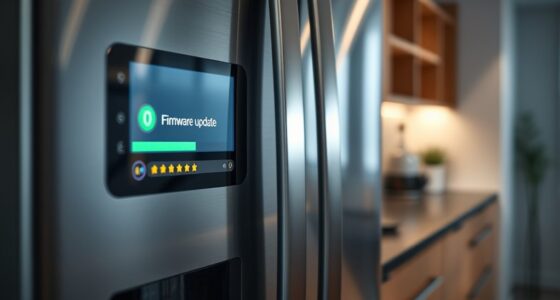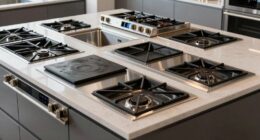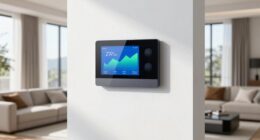Are you looking for smart ways to choose energy-efficient appliances? Your search ends here! We bring you the 5 Best Tips for Selecting Energy-Efficient Appliances.
In this guide, we will explore the key factors to consider when choosing appliances that not only save energy but also maximize efficiency. By following these tips, you will be able to make informed decisions and master the art of selecting appliances that align with your energy-saving goals.
From Energy Star Certification to Energy Consumption Ratings, we will cover it all.
So, let’s dive in and discover how to make your appliances work smarter, not harder. Let’s get started!

Key Takeaways
- Energy Star certification is important in identifying and promoting energy-efficient appliances.
- Consider the energy consumption ratings of appliances to make informed decisions and save on energy costs.
- Size and capacity considerations are essential in selecting energy-efficient appliances to minimize energy waste.
- Look for energy-saving features such as smart technology, improved insulation, and adjustable temperature settings to optimize energy usage.
Energy Star Certification
When selecting energy-efficient appliances, we highly recommend looking for those with Energy Star Certification. Energy Star is a voluntary program established by the Environmental Protection Agency (EPA) to identify and promote energy-efficient products. Appliances that bear the Energy Star label have been tested and verified to meet strict energy efficiency criteria set by the EPA.
One of the benefits of choosing Energy Star certified appliances is the potential for rebate programs. Many utility companies offer rebates to incentivize consumers to purchase energy-efficient appliances. These programs can help offset the initial cost of the appliance, making it more affordable in the long run.
Energy Star certified appliances also have a positive environmental impact. They consume less energy, which reduces greenhouse gas emissions and helps combat climate change. By choosing energy-efficient appliances, you’re contributing to a more sustainable future and reducing your carbon footprint.
Energy Consumption Ratings
To evaluate the energy efficiency of appliances, we rely on energy consumption ratings. These ratings help consumers make informed decisions about which appliances will consume less energy, thereby reducing their energy bills and environmental impact.

Here are some key points to consider when assessing energy consumption ratings:
- Energy Efficient Technology Advancements: Energy consumption ratings have become even more important with the advancements in energy-efficient technology. Newer appliances often have improved energy-saving features, resulting in lower energy consumption. Look for appliances with high energy efficiency ratings, such as those labeled with the Energy Star certification.
- Importance of Proper Maintenance: Regular maintenance is crucial in maintaining the energy efficiency of appliances. Dirty filters, clogged vents, and worn-out components can significantly impact energy consumption. By properly maintaining your appliances, you can ensure they operate at peak efficiency and minimize energy waste.
- Comparative Analysis: Energy consumption ratings allow for a comparative analysis of different appliances. These ratings provide a standardized metric that enables consumers to compare the energy efficiency of various models and brands. Look for appliances with lower energy consumption ratings to save both energy and money.
- Long-term Savings: Appliances with lower energy consumption ratings may have a higher upfront cost, but they can lead to substantial long-term savings. By investing in energy-efficient appliances, you can reduce your energy bills and recoup your investment over time.
- Environmental Impact: Energy consumption ratings also help reduce the environmental impact of appliances. By choosing appliances with lower energy consumption, you can contribute to a healthier planet by reducing greenhouse gas emissions and conserving natural resources.
Size and Capacity Considerations
Considering the size and capacity of appliances is essential in selecting energy-efficient options. When it comes to energy efficiency, bigger isn’t always better. For example, a larger refrigerator may have more storage space, but it also requires more energy to cool that space. It’s important to choose an appliance that’s appropriately sized for your needs to minimize energy waste.
In addition to size, the capacity of an appliance should also be taken into consideration. It’s important to select an appliance with a capacity that matches your usage requirements. An oversized appliance not only consumes more energy than necessary but also takes up more space in your home. On the other hand, an appliance that’s too small may not be able to meet your needs efficiently, resulting in higher energy consumption.
By carefully considering the size and capacity of appliances, you can ensure that you’re selecting the most energy-efficient options. This not only helps reduce your environmental impact but also saves you money on your energy bills. Remember to look for appliances with an energy-efficient design, as these are specifically engineered to consume less energy without compromising performance.

Energy-Saving Features
Now let’s delve into the energy-saving features of appliances to further enhance their efficiency. When it comes to energy-efficient appliances, there are several key features to look out for:
- Smart Technology: Appliances equipped with smart technology allow for better control and optimization of energy usage. With features such as remote control and energy monitoring, these appliances can adapt their settings based on usage patterns and energy demand, resulting in significant energy savings.
- Energy Efficient Design: Look for appliances that have been designed with energy efficiency in mind. This includes features such as improved insulation, advanced heat exchange systems, and optimized airflow. These design elements help to minimize energy loss and maximize the appliance’s overall efficiency.
- Energy-Saving Modes: Many appliances now come with energy-saving modes that allow you to reduce their energy consumption without sacrificing performance. These modes typically adjust settings such as temperature, brightness, or power output to optimize energy usage.
- Timers and Delay Start: Appliances with timers and delay start features enable you to schedule their operation at times when electricity rates are lower. By utilizing these features, you can take advantage of off-peak hours and save on your energy bills.
- Energy Star Certification: Look for appliances that bear the Energy Star label. This certification indicates that the appliance has met strict energy efficiency guidelines set by the Environmental Protection Agency. Energy Star appliances are designed to consume less energy without compromising performance.
Cost and Payback Analysis
When calculating the cost and payback analysis for energy-efficient appliances, we should take into account several factors. One key factor is the initial cost of the appliance. Energy-efficient appliances may have a higher upfront cost compared to their traditional counterparts. However, it is important to consider the long-term savings that can be achieved through reduced energy consumption.
To help you understand the potential savings, we have prepared a table outlining the average energy consumption and estimated annual cost for three common household appliances: a refrigerator, a washing machine, and a dishwasher. These figures are based on energy-efficient designs and average usage patterns.
| Appliance | Average Energy Consumption (kWh/year) | Estimated Annual Cost ($) |
|---|---|---|
| Refrigerator | 350 | 70 |
| Washing Machine | 400 | 80 |
| Dishwasher | 300 | 60 |
As you can see, energy-efficient appliances consume less energy, resulting in lower annual costs. While the initial investment may be higher, the long-term savings can offset this cost over time. It is important to consider the payback period, which is the time it takes for the energy savings to cover the additional cost of the energy-efficient appliance.

Frequently Asked Questions
Are There Any Government Incentives or Rebates Available for Purchasing Energy-Efficient Appliances?
There are government programs that provide financial incentives for purchasing energy-efficient appliances. These incentives can come in the form of rebates or tax credits.
By taking advantage of these programs, consumers can save money while also reducing their energy consumption. It’s important to research and understand the specific requirements and eligibility criteria for each program in order to maximize the benefits.
These government incentives can be a helpful tool in encouraging the adoption of energy-efficient appliances.
How Often Should I Replace My Old Appliances With Newer, More Energy-Efficient Models?
When considering the replacement frequency of old appliances with newer, more energy-efficient models, it’s important to weigh the cost effectiveness. Although there’s no set timeframe for replacing appliances, it’s generally recommended to replace them every 10-15 years.

However, if your current appliances are outdated and not energy-efficient, replacing them sooner may result in significant energy savings and lower utility bills.
It’s advisable to research and compare the energy efficiency ratings of different models before making a purchase decision.
What Is the Average Lifespan of Energy-Efficient Appliances Compared to Traditional Ones?
When it comes to the average lifespan of energy-efficient appliances compared to traditional ones, there are some important factors to consider.
Energy-efficient appliances are designed to use less energy, resulting in lower utility bills and a smaller environmental footprint.

While the lifespan of appliances can vary depending on usage and maintenance, energy-efficient models are generally built to last just as long as their traditional counterparts.
Therefore, investing in energy-efficient appliances not only helps the environment but also provides long-term savings.
Can Using Energy-Efficient Appliances Help Reduce My Carbon Footprint?
Using energy-efficient appliances offers several benefits, including the reduction of our carbon footprint. These appliances are designed to consume less energy, which leads to lower electricity bills and less strain on the environment.
Are There Any Additional Maintenance or Care Requirements for Energy-Efficient Appliances Compared to Regular Ones?
When it comes to energy-efficient appliances, it’s important to consider any additional maintenance requirements and care tips.

These appliances often require regular cleaning and filter replacements to ensure optimal performance.
Additionally, it’s crucial to schedule professional maintenance checks to address any potential issues and keep them running efficiently.
What Are the Key Factors to Consider When Choosing Energy-Efficient Appliances for a Commercial Kitchen?
When selecting energy-efficient kitchen appliances for a commercial kitchen, it’s crucial to consider the energy star rating, overall energy consumption, and specific features such as programmable settings and energy-saving modes. Investing in energyefficient kitchen appliances can result in significant long-term cost savings and reduced environmental impact.
Conclusion
In conclusion, by carefully considering Energy Star certification, energy consumption ratings, size and capacity, energy-saving features, and cost analysis, we can make informed decisions when selecting energy-efficient appliances.
This not only helps us reduce our carbon footprint and conserve energy but also saves us money in the long run.

With these tips at hand, we can make a positive impact on our environment and our wallets.









